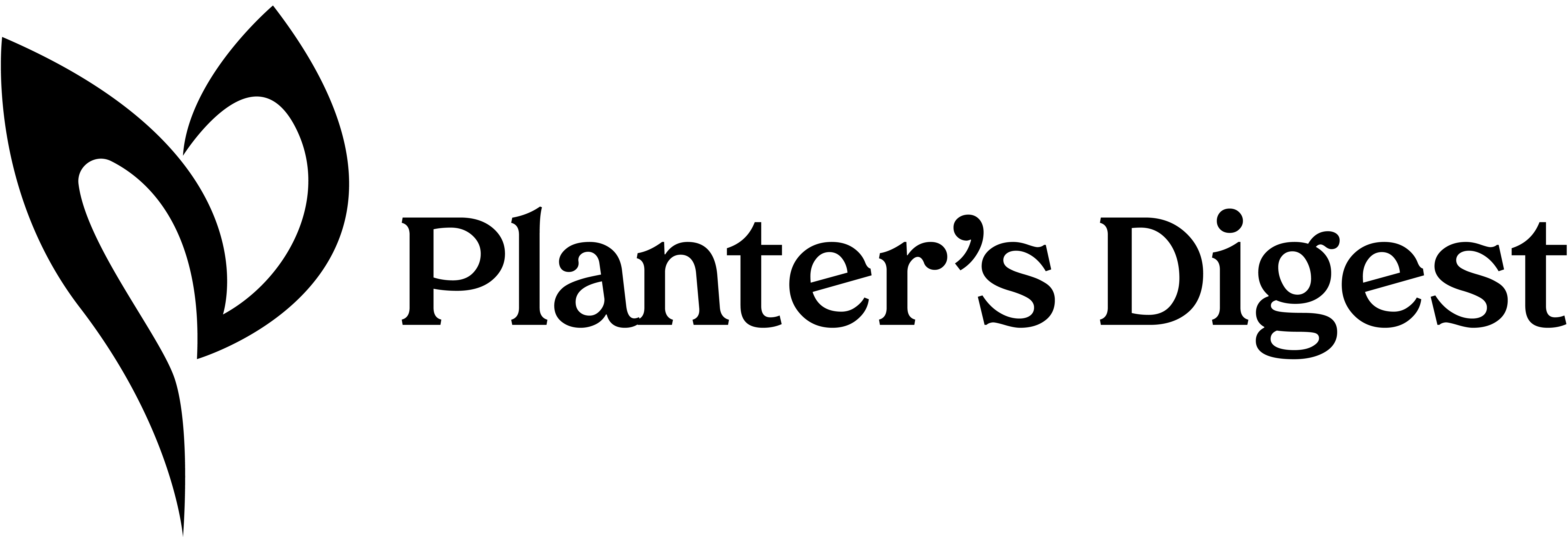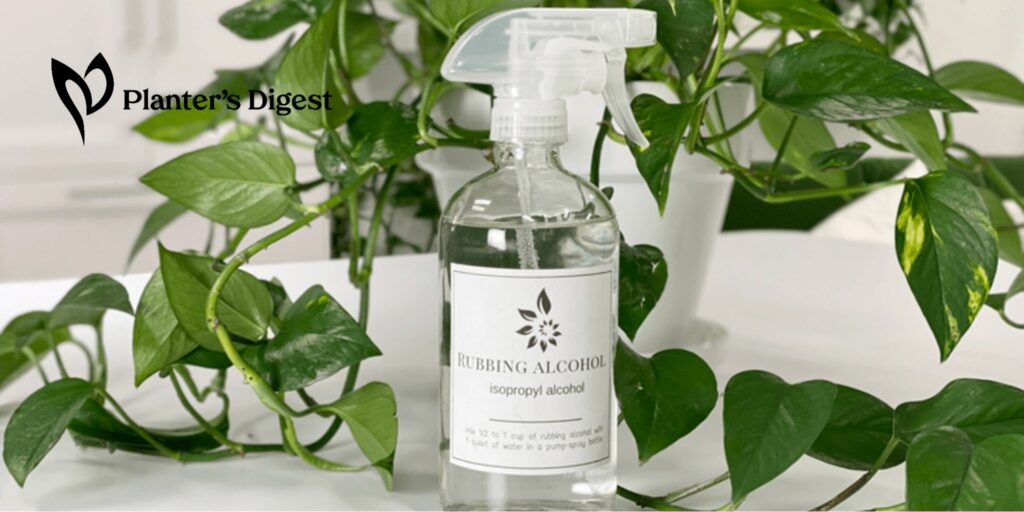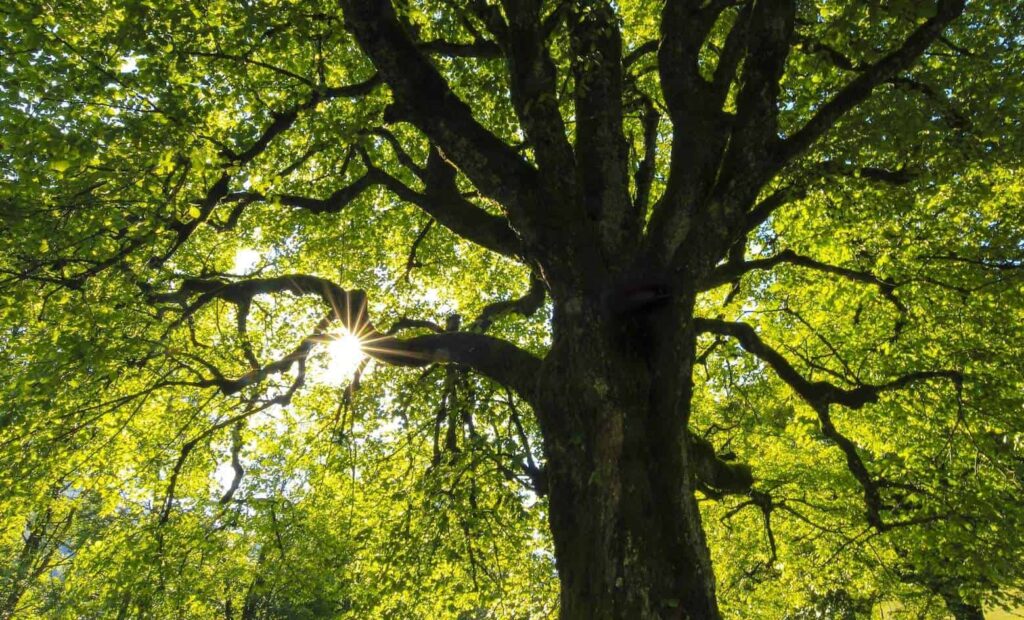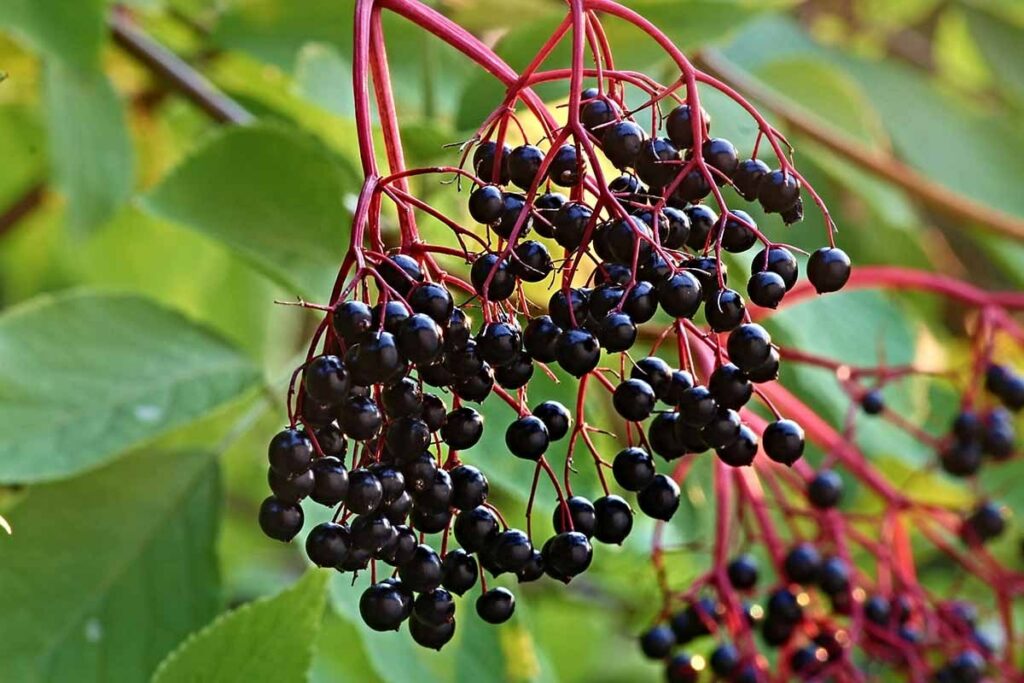Some gardeners believe it’s safe to spray alcohol on plants and the bugs that bother them. While there might be some truth to this, it’s important to understand that too much alcohol can harm plants in the long run.
Now, if you’re scratching your head wondering if alcohol’s the right sidekick for your indoor plant posse, then you’re in luck, my friend. This article is your trusty guide through the wild world of alcohol as an insecticide!
What does an alcohol spray do to plants?
High concentrations of alcohol spray can harm plants if applied directly. Pure alcohol damages plant tissues and slows growth.
Instead, diluted solutions, like rubbing alcohol mixed with water, are safer for disinfecting plant tools or plant surfaces.
Yep, you read that right! Alcohol isn’t just for cocktails — it’s got some serious bug-busting and weed-whacking skills up its sleeve! But here’s the issue: it’s not picky about who it takes down.
When alcohol’s on the scene, it’s open season on both pesky pests and those innocent little plants you’re trying to keep alive. It’s also moonlighting as a growth guru, either slowing down or revving up plant growth, depending on the concentration.
And if that weren’t enough, alcohol’s pulling double duty as a herbicide, showing those pesky weeds who’s boss.
How does alcohol spray help plants?
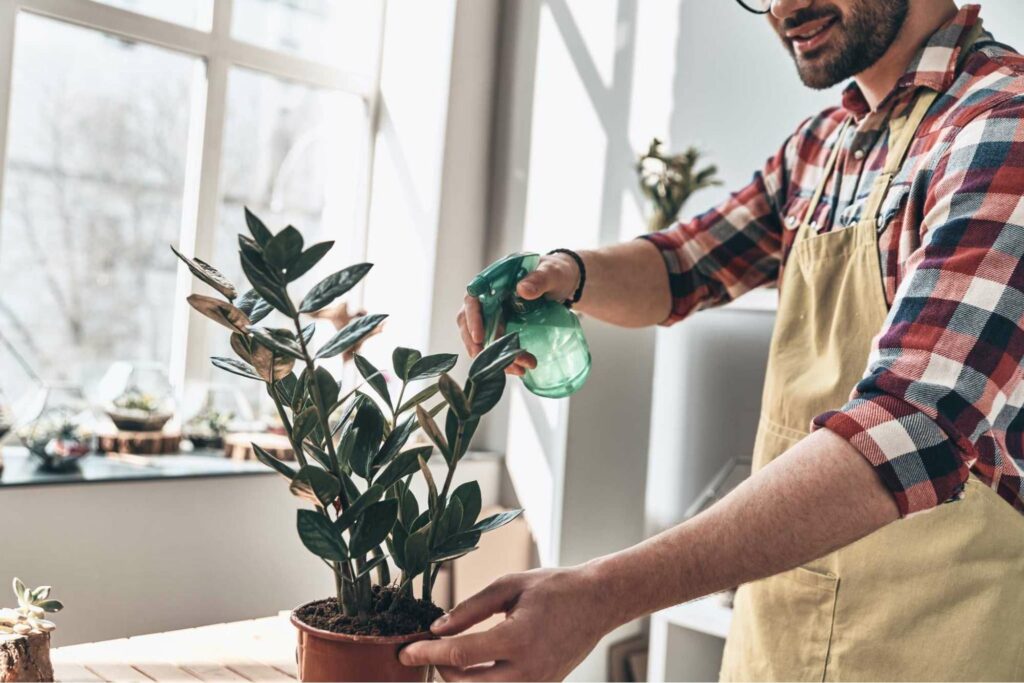
Alcohol spray can help plants by effectively eliminating pesky bugs that harm plants, regulating plant growth, controlling pests, managing weeds, and even rejuvenating flowers.
Kill Insects
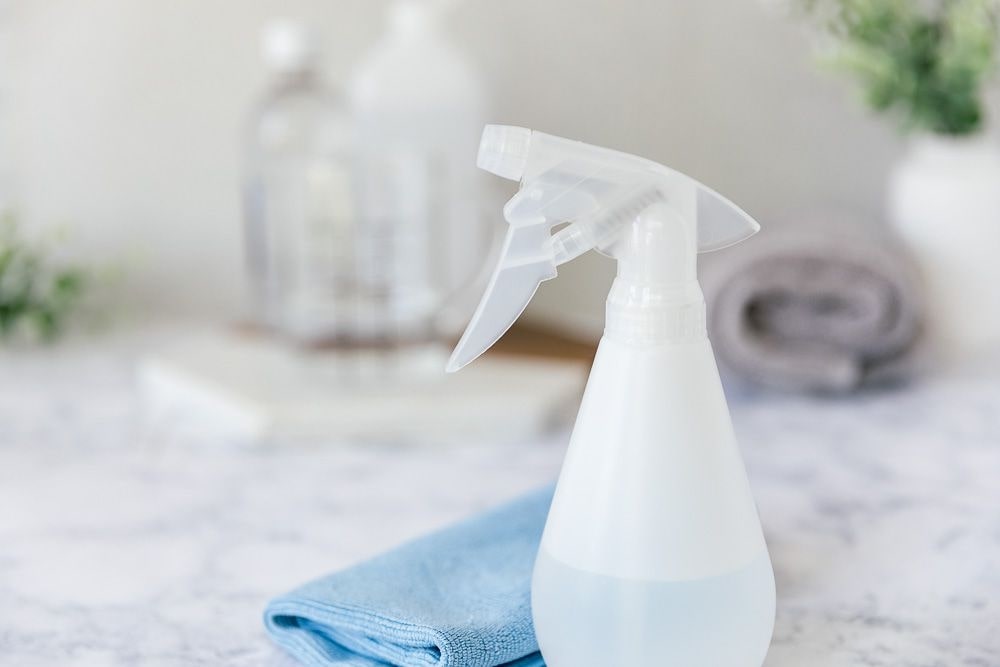
Did you know that alcoholic drinks containing ethanol have the remarkable ability to eliminate soft-bodied insects like mites, aphids, scales, whiteflies, fungus gnats, and mealybugs? It’s true!
Using a cotton bud dabbed with alcohol as a spot treatment can be just as effective as full spraying.
But how exactly does alcohol achieve this? Well, it operates in two key ways.
First, alcohol acts as a desiccant, essentially drawing out water from the insect’s body. Second, it serves as a surfactant, able to penetrate and wet through the waxy skin of these pests.
When the alcohol gets cozy with those pesky bugs, it’s lights out for them. Adding a splash of liquid soap to your alcohol concoction can kick it up a notch by cutting through the waterproof shield of critters like mealybugs.
Now, picking the right booze for your bug-busting brew is key. Rubbing alcohol (isopropanol or isopropyl) is the go-to, but make sure it’s pure as a summer breeze — no additives allowed for maximum bug-blasting power!
But hold on to your gardening gloves, because some green-thumbed gurus swear by ethanol (grain alcohol) for an extra potent punch against insect invaders.
Control Plant Growth
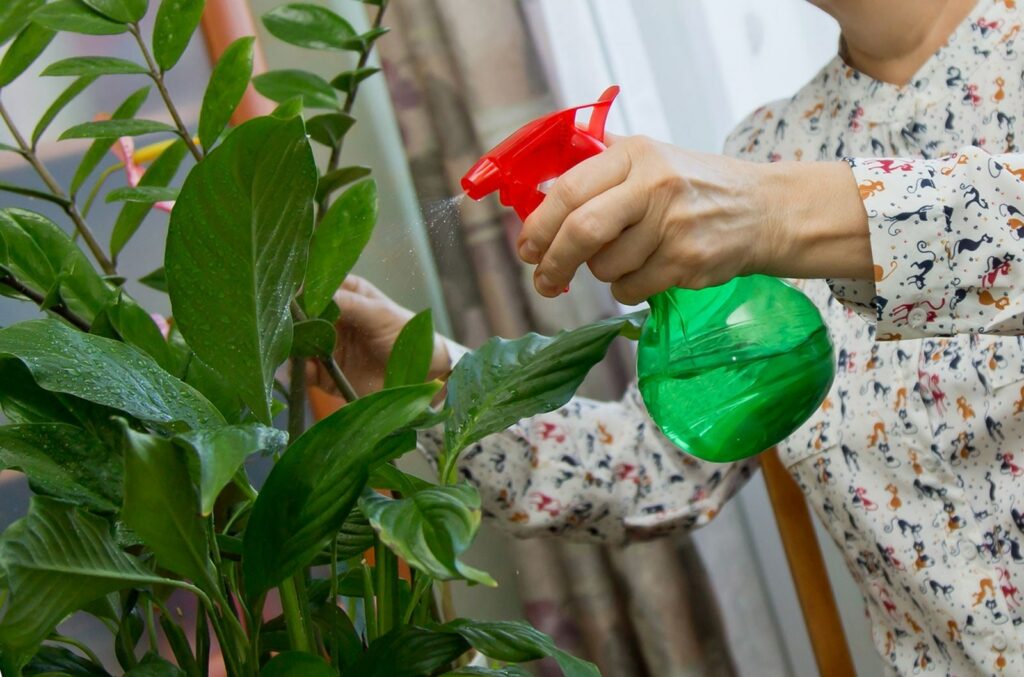
Farmers sometimes sneak some alcohol into the mix to give those plants a little boost. Yeah, we were a little surprised too, when we found that out!
And guess what? Indoor gardeners are in on the action as well, using alcohol to keep their green babies from growing too fast.
Now, we’ve got isopropyl alcohol, ethanol, and methanol as options. Each one of these bad boys plays a different role in the plant world.
It’s like a party for plants, with each alcohol bringing its own unique vibe to the table.
Kill Weeds
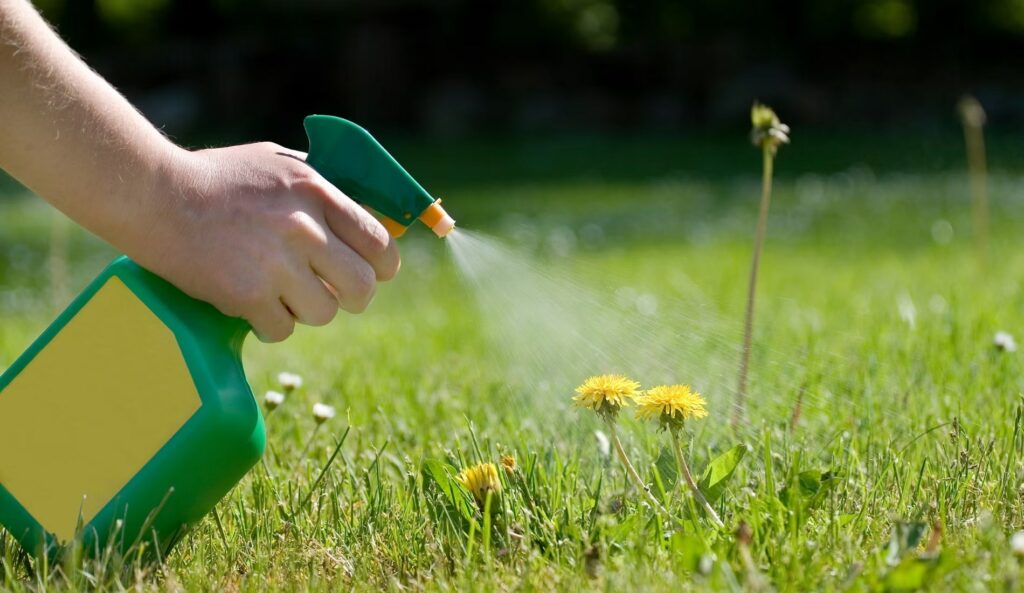
Alcohol is the elixir of life for some plants, but a deadly cocktail for others! Spritzing it on leaves might sound like a quirky gardening hack, promising to bid adieu to pesky weeds like they’re last season’s fashion.
But tread carefully, my green-thumbed friend! Why the hesitation, you ask?
Well, allow us to break it down for you. Firstly, using alcohol as your garden’s weed whisperer can hit your wallet harder than a hangover hitting at brunch o’clock.
And secondly, dousing plant roots in alcohol is like throwing a party in a puddle — it’s a no-go zone! Even the plants you’re rooting for might end up looking wilted and worse for wear.
Now, if it’s those pesky weeds you’re after — well, spraying in broad daylight is fair game! Just remember, if you’re going for the root, anything soaked in alcohol soil-wise won’t be sprouting anytime soon.
Planter’s Tip:
You can create your own insecticidal spray by combining equal parts of 70 percent strength alcohol and water. If you’re using a stronger concentration like 95 percent alcohol, mix 1 ½ parts water to 1 part alcohol.
Now, don’t go dousing your plants just yet! Test the potion on a leaf or two for about 5 hours.
If those leaves aren’t looking crispy afterward, you’re good to go.
If those pesky critters are still hanging around like uninvited guests at a party, give them another spritz in about a week. Keep at it until those bugs get the message: it’s time to bug off!
Does alcohol kill plants?
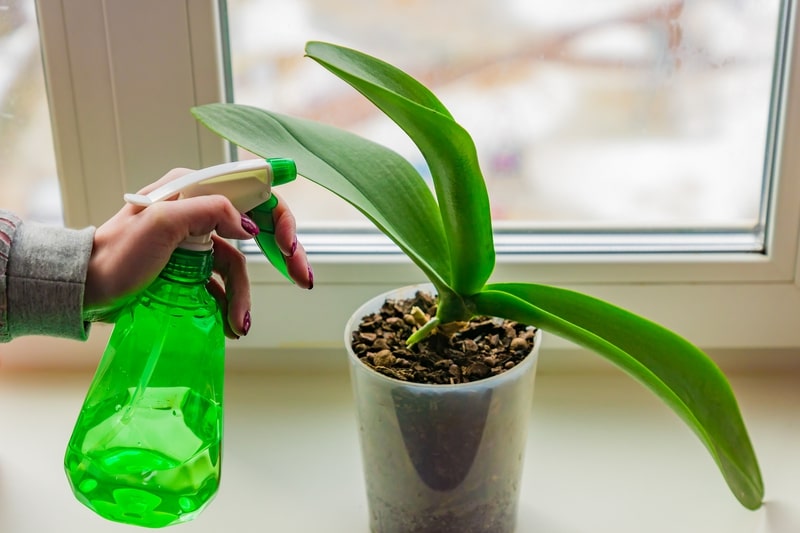
Alcohol can harm or even kill a plant. It’s better to use it carefully by applying it directly to problem areas with a cotton swab, or by mixing it with water before putting it on the plant.
Dousing your plant with too much alcohol is a surefire way to leave those leaves feeling crispy and not in a good way. It’s like giving your plant a one-way ticket to a desert vacation.
And let’s not forget about the poor soil — it’s not a fan of being poisoned, believe it or not, and it’ll make life tough for your thirsty green friend.
Oops! Did you go overboard with the alcohol? No worries, we’ve got you covered.
You need to give those leaves a good rinse — pronto! Think of it as a spa day for your plant — minus the cucumber slices.
After the rinse, pat those leaves dry gently, just like you would after a bubble bath. And if the soil’s taken a hit, well, it might be time for a change of scenery.
Yep, it’s repotting time, my friend. Let’s give that plant a fresh start and hope it forgives us for the alcohol overload (and subsequent hangover).
How to Use Alcohol on Plants with Pests
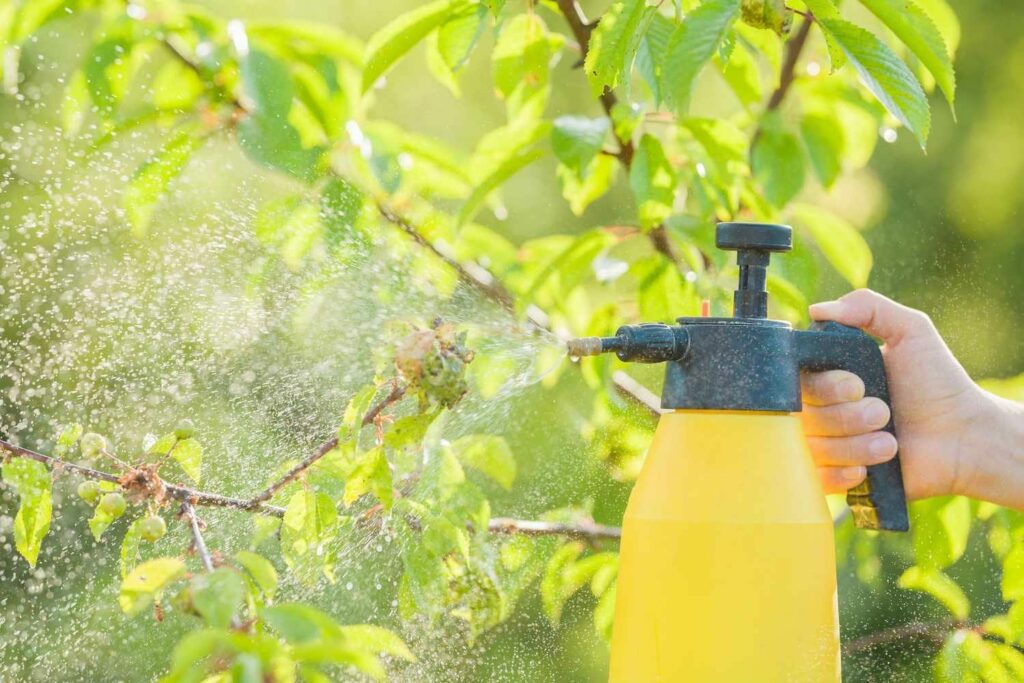
Alcohol (that good ol’ bug buster) knows just how to crash the party for mealybugs, aphids, thrips, spider mites, snails, slugs, and whiteflies. It’s like a tough bouncer breaking down their wax armor and leaving them high and dry.
But watch out: those sneaky bugs might still hatch new recruits from their eggs or pupae! This means you might have to play bartender and serve up another round of alcohol when they do.
How to Use Alcohol Spray on Plant Pests
- Identify the pests on the plants.
- Mix rubbing alcohol and water (you can add a few drops of liquid soap as well) to create a solution.
- Test the solution on a small leaf area and wait for a day.
- Apply the solution directly to pests or eggs using a cotton swab. Avoid excessive spraying to prevent plant damage and use alcohol in moderation to prevent dehydration or plant death.
- Reapply solution as needed, especially after new pests emerge.
Well, before you go all-out spraying alcohol like it’s a garden party, let’s talk moderation. You see, drowning your plants in an alcohol solution might seem like a genius move, but trust me, it can backfire faster than you can say “bugs off!”
If you overdo it, the alcohol drips down those leaves, and before you know it, your insecticide has turned into a full-blown herbicide. Talk about a plot twist!
Instead of going ham with the spray bottle, here’s a gentler way: grab yourself a cotton swab. Dab that alcohol solution directly onto those mealybugs and their eggs.
It’s like a precision strike, targeting those little suckers without drenching your leaves and sending your plants into a dehydration frenzy.
Sure, we get it, using a cotton swab might sound as thrilling as watching paint dry — and it can get pretty tedious too! But hey, better safe than sorry, am I right?
Types of Alcohol to Use on Plants
Now that we’ve mastered the art of plant-friendly alcohol spraying, let’s dive into which types of alcohol won’t leave your plants feeling tipsy or hung over. Here are some alcohol options that might just save your plants’ day!
Isopropyl or Rubbing Alcohol
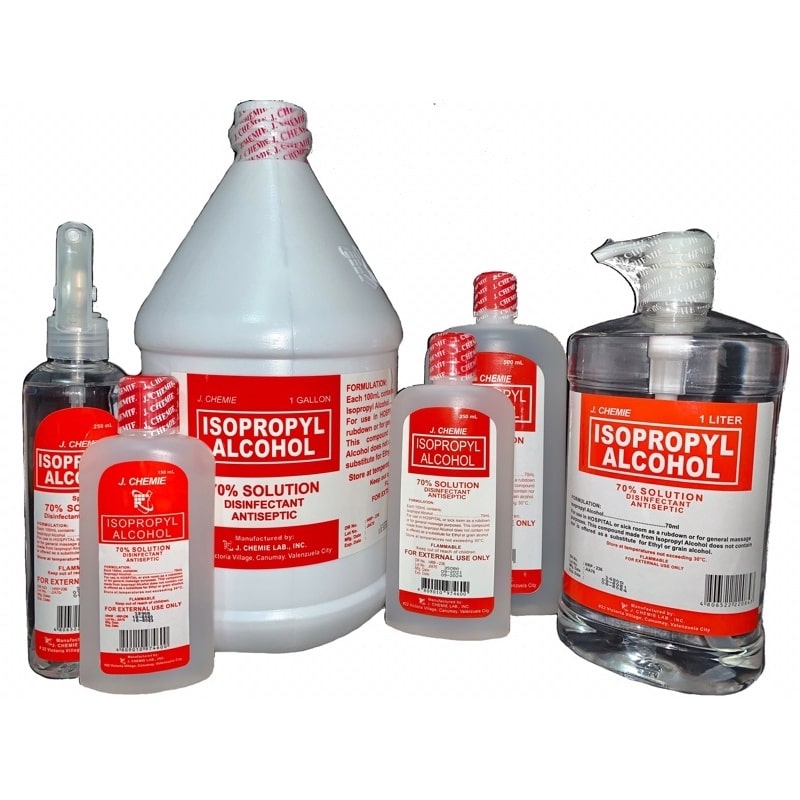
Rubbing alcohol, also known as isopropyl alcohol, is the top choice for use on plants. It’s practical and budget-friendly.
Usually, it’s 70% alcohol, so you need to dilute it a lot before using it. If it’s too strong, it can hurt the plants instead of helping them.
Mixing it with water at a ratio of 20 parts water to one part rubbing alcohol gives you a solution that’s about 3.33% rubbing alcohol. Sounds promising, right?
While it might zap those bugs, it’s also a bit heavy-handed on the herbicide front, meaning it could potentially wreak havoc on your beloved plants. So, if you’re gonna go down this route, tread carefully, my friend.
And heaven forbid you go overboard and treat them with anything more than 25 percent isopropyl alcohol — your poor plants might end up scarred, damaged, or even pushing up daisies.
Oh, and here’s a little nugget of knowledge for you: 70% isopropyl alcohol is the superhero of antiseptics. You can safely give your plants a spritz with this stuff to send aphids and other soft-bodied insects packing.
Ethanol or Ethyl Alcohol
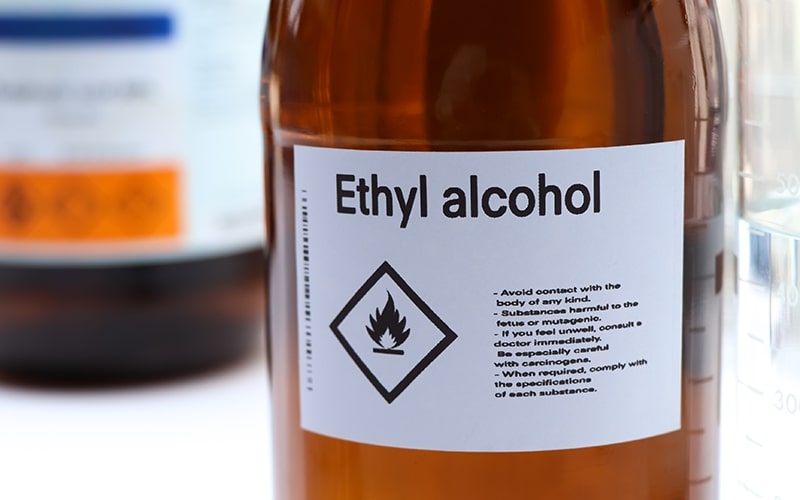
Ethanol, also known as ethyl alcohol, can slow down plant growth. For instance, you can mix a bit of ethanol with water and add it to paperwhites, bougainvillea, or daffodils to make them last longer indoors.
Research shows that solutions with 4% to 6% ethanol can stop these flowers from growing too much. But beware: solutions with more than 10% ethanol can harm or kill the plants.
If you’re tired of trimming your indoor plants or worry about hurting them, you can try using a 5% ethanol solution to slow their growth.
Plants can get stressed out if you give them too much ethanol — like a 10% solution. And if the ethanol content goes up to 25%, it can actually kill the plant.
Methanol
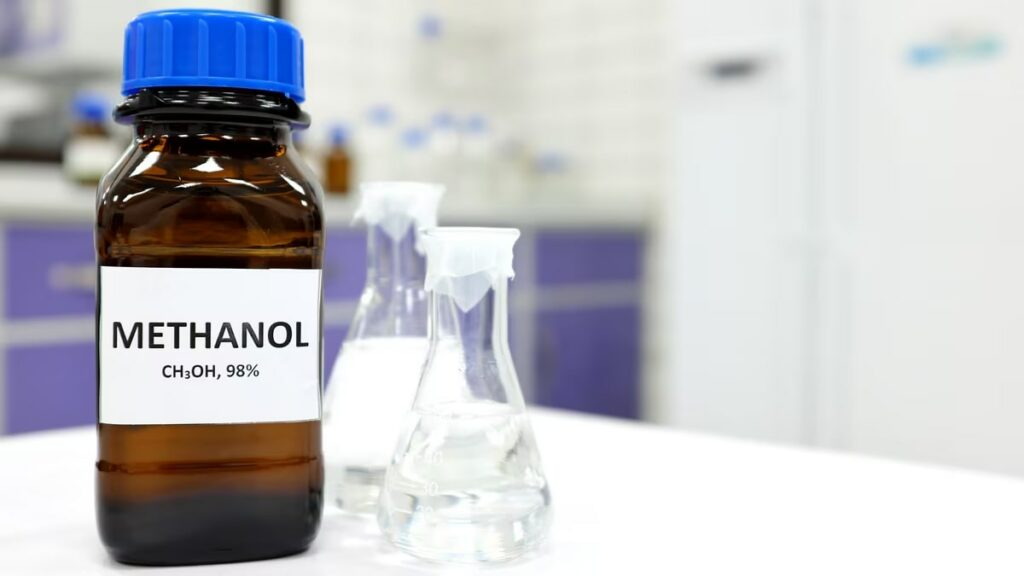
Methanol is the simplest form of alcohol. It is commercially available as racing fuel and for other applications.
Some studies say it’s like a magic potion for certain greens like wheat, rye, fescue, and bluegrass. But other research throws shade on its effectiveness, suggesting it might put the brakes on growth for some plants.
Plants are apparently fans of methanol, aka wood alcohol or methyl alcohol, just like they’re fans of carbon dioxide. It’s like their version of a fancy energy drink.
And get this — scientists have discovered that the best cocktail for plant growth is a mix that’s 30 percent methanol and 70 percent water.
If you want to see your peas, tomatoes, and a whole bunch of other plants thrive, consider giving them a spritz of diluted ethanol and methanol. Yep, it’s a real thing, and it’s even sold commercially!
How often can I use rubbing alcohol on plants?
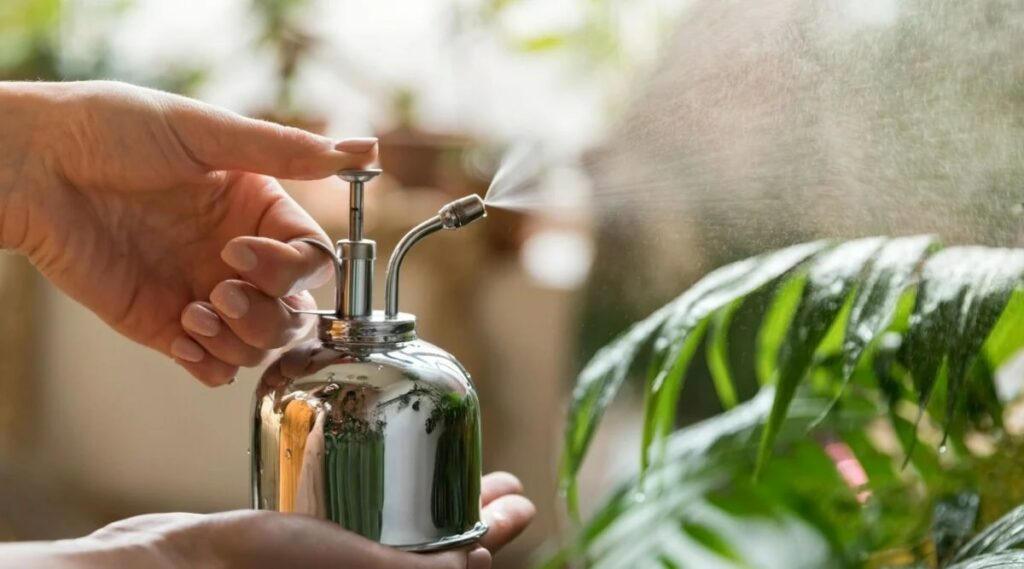
You can use rubbing alcohol on your plants once a week for up to four weeks to get rid of pests. But don’t overdo it — using alcohol too much or for too long can harm your plant.
If those little critters refuse to buzz off, it might be time to get creative with your bug-busting strategies.
But before you go drenching your green pals in rubbing alcohol, remember: that stuff’s for bugs, not for turning your gardening routine into a DIY science experiment gone wrong.
It’s good to keep those plants pampered and pest-free, but maybe leave the chemistry experiments for another day, okay?
How to Know If Your Plant Can Handle Alcohol
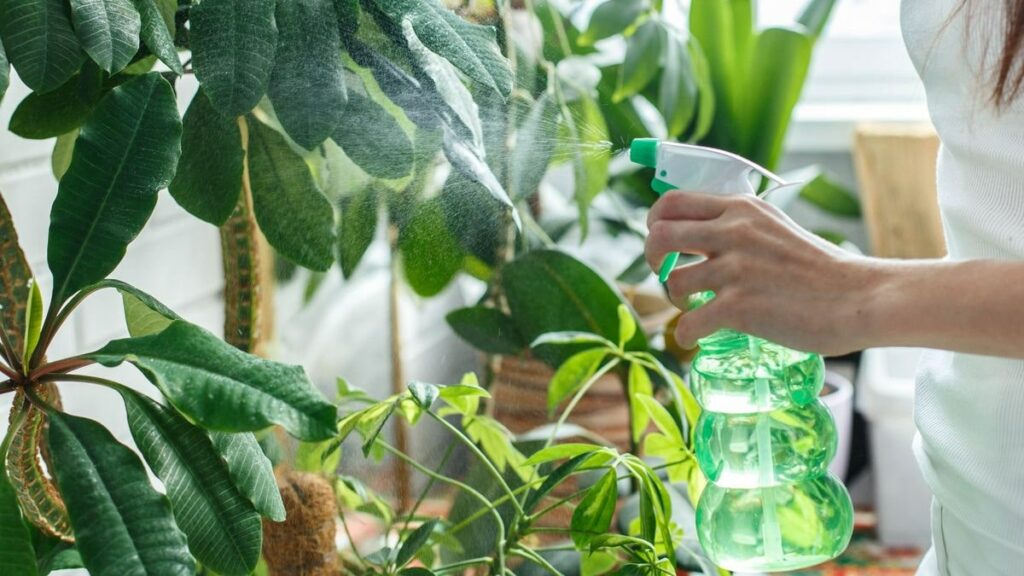
Some plants handle alcohol better than others. Test a small amount on one leaf first.
If it’s okay, you can use it on the whole plant. If not, try milder options like soap.
Remember, too much alcohol can stop plants from soaking up water properly. If your plant gets too much alcohol, it might start to shrink, get stressed, and eventually die.
Remember to always use a spray bottle and never pour alcohol directly onto the plant or soil.
FAQs
Can alcohol damage leaves?
Yes, alcohol can damage leaves. Alcohol can kill weeds, but it also kills other plants you might want to keep.
What happens if I water plants with alcohol?
Watering plants with alcohol, such as rubbing alcohol, can harm them. Alcohol can damage the delicate balance of moisture and nutrients in the soil, leading to dehydration and nutrient imbalances in the plants.
Additionally, alcohol can harm plant roots and interfere with their ability to absorb water and nutrients from the soil.
Is it OK to spray rubbing alcohol on plants?
No, it’s not recommended to spray rubbing alcohol on plants. Rubbing alcohol can harm or even kill plants by damaging their foliage and sensitive tissues.
It can also disrupt the balance of beneficial microorganisms in the soil.
Can I use alcoholic beverages in the garden?
No, it’s not recommended to use alcoholic beverages in the garden. While alcoholic drinks have ethanol, they’ve also got sugars and other stuff that can make bacteria and fungi grow.
These germs can harm plants, so it’s best not to use booze to encourage their growth.
Are there other uses for alcohol in the garden?
Yes, there are other uses for alcohol in the garden. You can clean your garden tools with rubbing alcohol.
Just dip the ends of your trowels, shovels, or other tools in a mix of 2% to 3% rubbing alcohol. Then, rinse them well with water before using them again in your garden.

